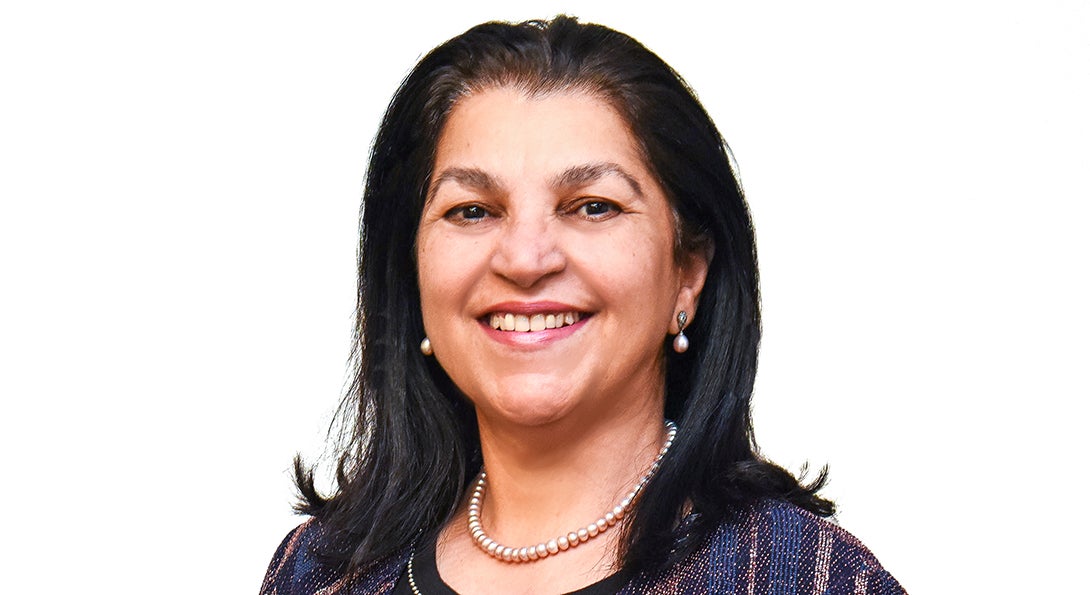UIC Nursing Alumni–Naeema Al-Gasseer

'My passion is working in the field'
Growing up near a nursing school in Salamniya, Bahrain, Naeema Al-Gasseer, PhD ’90, MS ’87, admired its students. But it was her father’s ill health that brought her into close contact with nurses.
“I saw how well he was taken care of,” she says. “I saw more nurses around him than anyone else.”
This caring aspect of the profession impressed the young Al-Gasseer, who decided to study nursing and midwifery at a school near her home rather than take one of the other opportunities she was offered to study science or medicine further afield. The only barrier that remained was convincing her family, who didn’t view nursing as a prestigious job. “I told them I would get my degree and I would change that image,” Al-Gasseer says. “I told my grandfather that by the time I graduated, he would encourage others from the family to join the nursing profession.”
When she received her degree, not only did Al-Gasseer’s grandfather urge her cousins to become nurses, but neighbors who had questioned her choice began to suggest nursing to their daughters based on her example.
This determination to promote nursing has propelled Al-Gasseer beyond the borders of Bahrain to the top ranks of the World Health Organization, where she is currently the WHO representative in Egypt.
Prior to that, she was WHO representative in Sudan. During her time in that role – which coincided with the Sudanese Revolution during 2018 and 2019 – she focused on health promotion and addressing social determinants of health. She worked to strengthen health systems, universal health coverage and health insurance policies. She addressed harmful practices, such as female genital mutilation, as well as several epidemics and outbreaks, including COVID-19.
She has continued to combat the pandemic from her post in Egypt through workforce capacity-building, infection control, early detection, clinical trials and advocating for protective equipment for healthcare workers.
“My passion is working in the field, translating strategies into ‘on the ground’ plans of action through engagement, innovation and creative approaches,” she says.
Al-Gasseer has always believed that nursing extends beyond curative care by facilitating healthy living and well-being. This is what motivated her to continue her studies at the American University of Beirut and then at UIC. She was the second person from the six Persian Gulf nations to hold a PhD in nursing when she graduated over two decades ago. Upon her return to Bahrain, Al-Gasseer often was called upon to share her expertise and became involved in health strategy and policy. She was the first woman from the Gulf Region to address the Ministers of Health of the Gulf Cooperation Council.
Al-Gasseer credits the excellent mentors and multidisciplinary education she received at UIC for her ability to become influential in women’s health issues. The degree helped open doors, she says. To expand her opportunities for creating change, Al-Gasseer joined WHO in 1996 as a technical officer in training and curriculum development in reproductive health and family planning, as well as primary health care. She quickly rose through the ranks to become senior scientist for nursing and midwifery at the organization’s headquarters in Geneva, establishing global policy and strategy for nursing and midwifery development.
Her work has earned her numerous awards and accolades. She was honored with the First Rank Award for Competence in 2016 by the king of Bahrain, named a fellow of the American Academy of Nursing and given the Gulf Cooperation Council Arab Health Ministers Council Award for Excellence in Nursing. She also received the leadership award in social responsibility from the Arab Regional Network for Social Responsibility in Kuwait in 2018.
Being able to advance the field of nursing while shaping global health policy has been incredibly rewarding for Al-Gasseer.
“I believe in making a difference,” she says. “In my current post, we can bring change. This is the pride I have in being a nurse within WHO.”